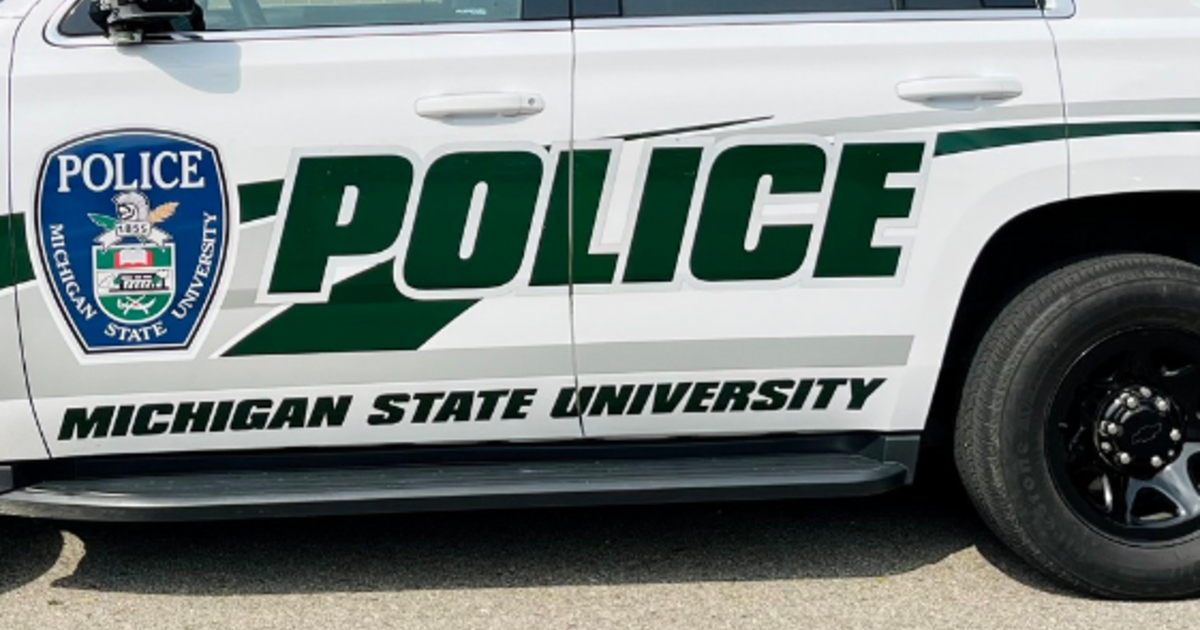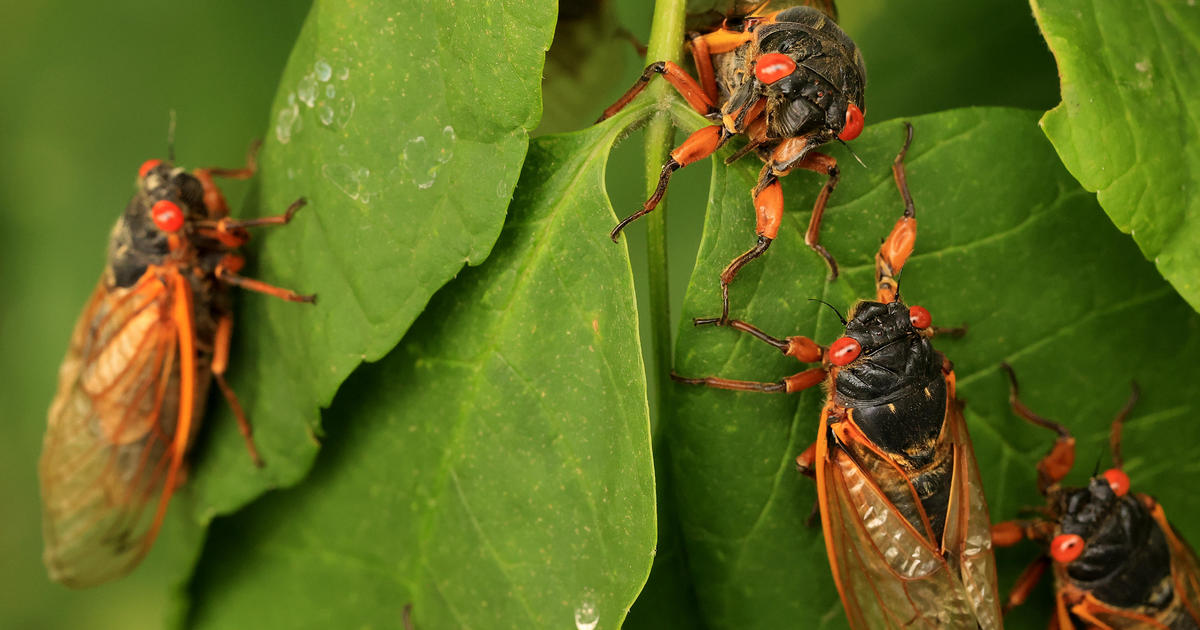Tech Tour Day Eight: Ferris State Biotech Booming At The Edge Of The North Woods
BIG RAPIDS (WWJ) -- Here at the southern edge of the Manistee National Forest is about as far south as you can be and still be Up North. When you look west from the top floor of the Holiday Inn, on the golf course owned by Ferris State University, all you see is trees (that this week were exploding in peak color).
Despite the rustic setting, you wouldn't believe what they're doing in the science labs at Ferris State -- both educationally, turning out hundreds of scientists for Michigan's biotech industry, and in terms of research, where among others I met a professor who's trying to see if he can translate a 50 percent increase in fruit fly lifespan into something humans could benefit from.
My day started at 8 a.m. in a conference room at the Arts and Sciences Commons with Rick S. Kurtz, dean of Ferris State's College of Arts and Sciences, and a cast of, well, half a dozen of the professors who would be showing off their students and their programs.
Ferris State has just over 10,000 students on campus and just under 15,000 total thanks to off-campus programs. Kurtz said it offers a "unique mix" of technical, professional and "applied practitioner" degrees -- as befits an institution that started out as a two-year vocational school, the Ferris Institute, and was acquired by the state in the early 1950s.
My day began with mathematics, where department head Kirk Weller said the school has seen "tremendous growth in student interest." Ferris' actuarial science program supplies workers to insurance, finance and government institutions and prepares them for the first two of the five professional exams required for membership in the Society of Actuaries.
"Rather than simply offering the course work that would go with it, we are actually offering courses that prepare students for those exams," Weller said. "We think that sets us apart, at least in the state of Michigan."
The program offers minors in finance, concentrations in computer science, and certificates in risk assessment and data mining, for students who want to specialize within math.
I also spoke with Victor Piercey and David McClendon, assistant professors of mathematics who both joined Ferris' faculty two years ago. Piercey says he's working on a quantitative mathematics course for business majors where students work in teams on mathematical formulas from the real world.
Like fry efficiency. Yes, as in French fries. "When I was a manager of an Arby's in college I had to do this calculation," Piercey said. "The basic calculation is, you take the weight of the fries that were sold that day, and the weight of the fries that were used that day, and you get a rate of efficiency."
Piercey said the program really helps bring the practical application of mathematics to life for business students. And he's adding experience in public speaking and presentations to his math classes to prepare students for how math is used in business.
McClendon, for his part, says he enjoys working "with lower level students, who struggle, who have math anxiety." And he says he also teaches a course in probability that prepares students for the first of those five actuarial exams.
Both men said actuarial science isn't just for life insurance companies trying to figure out when their customers are going to die. Piercey pointed out that Gov. Rick Snyder just hired a new state treasurer with an actuarial science background who's going to try to develop an actuarial model that predicts which communities will eventually fall into financial trouble, so state government can help them before it becomes a crisis. And, he said, the federal government expects actuarial jobs to grow at twice the average rate of job growth in the years ahead.
Like virtually all of the faculty I talked to, they praised Ferris State's intimate size as "a private college education at a public college price."
"We have much smaller classes, a faculty whose No. 1 job is teaching, a faculty committed to innovative teaching, and many opportunities for interaction with faculty outside the classroom," McClendon said.
------------------------------------------------------
Then I started my sojourn through Ferris State's biosciences programs, beginning with professor Kim Colvert and a class full of students doing protein identification from biological samples.
Colvert has been at Ferris since 1988 after getting a Ph.D. from the University of Arkansas at Fayetteville and teaching at a school in Missouri. She said she was initially attracted by Ferris' teaching focus.
"Classes are small and there's a lot of interaction with faculty," she said of her classes in biochemistry and protein methodologies.
She said Ferris students who graduate with a bachelor's degree in biochemistry can step into lab tech jobs in the $35,000 to $45,000 a year salary range, and can combine it with other minors for other jobs or graduate school, from technical communication to cell and molecular biology to psychology.
As for her students, Jamie Hook of Memphis said she was a double major in biotech and forensic biology and hadn't yet decided on a career path, while Allison Hosmer of Saginaw is hoping for a job at the Ann Arbor biotech firm where she had an internship last summer.
-------------------------------------------------------
Then it was round the corner to Bill Killian's industrial chemistry technology program, a two-year associate's degree program that dates back to the 1950s. It has placed hundreds of people at Michigan chemical and pharma companies like Dow Chemical, Dow Corning, Pfizer and Perrigo.
Killian is only the second director of the program in its 50-year history, so there's a lot of institutional stability here.
"The associate degree is intended to prepare you for actual hands-on work in the laboratory," he said.
The program features a chemical manufacturing class that's eight hours long one day a week -- basically teaching students what it will be like to work eight hours a day in a chemistry lab, working on chemical and environmental analysis projects for industry.
The program features a very small class size -- anywhere from eight to 15 students per class.
---------------------------------------------------------------
Then it was up to the DNA analysis laboratory of Bradley J. Isler, who coordinates Ferris' biotech program, which hit 25 years of operation this year. About 50 students are currently enrolled in the program.
"The curriculum hasn't changed that much over the years," Isler said. "We want to give students smart brain skills and smart hand skills. They know the science, but they also have the hand skills to work in a laboratory."
The first two years of the program are basically the same as a biology major -- general chemistry, general biology, organic chemistry, anatomy and physiology. It's in the second two years that the program specializes in stuff like DNA analysis, protein analysis, and bioinformatics.
Ferris also emphasizes laboratory animal handling, since many of its graduates go on to work for laboratories doing animal pharmaceutical testing, like MPI Research in Mattawan. Ferris maintains a vivarium of mice, rats, rabbits, pigeons and zebra fish that are used in experiments.
"When our students are done they have a very comprehensive set of skills that are very much in demand with employers," Isler said.
Isler's research assistant, senior Chase Judy of Grand Rapids, said his career goal "is to go into the industry and find a job in genetic research of some sort." He's also a dual major in forensic biology, another popular program at Ferris State, "so I haven't ruled out working in a crime lab ... that's a passion of mine, but it's a lot harder to get into." (Guess you can blame CSI.)
Isler's current research involve testing the genes of a line of rates that arose out of a mutation at Ferris State -- the rats had anophthalmia, meaning they were born without eyeballs. Isler is trying to track down the genetic basis of this mutation, which can affect people too.
--------------------------------------------------------------
My final stop was at the laboratory of professor Changqi Zhu and his student assistant, Shaughna Langerak, a junior biotech major from Howard City.
Zhu is working on a study of aging in fruit flies, trying to determine the molecular mechanisms behind aging.
Zhu has mutated fruit flies to live three months -- 50 percent longer than their normal life span of two months. He's done this by creating flies that overexpress a protein called Transferring Growth Factor beta, or TGF-b.
Fruit flies that have the mutation from only one parent -- a condition called heterozygous -- have the long life span. Fruit flies that have the mutation from both parents, called homozygous, die.
Zhu created the mutation that leads to the long life span before he came to Ferris, when he was working at the University of Minnesota. The mutation is induced into fruit fly eggs.
"Theoretically, we could be able to use this technology to extend human life span," Zhu said, though obviously years and years of work remain to be done. The same protein in humans boosts cellular growth and bone growth, Zhu said.
For now, Zhu is studying the molecular and cellular mechanism of action of the factor, finding out exactly how it works in the files.
Langerak will make a presentation on the research Nov. 16 at an undergraduate research conference at the Van Andel Institute in Grand Rapids.
Zhu earned his bachelor's and master's degree in biology and genetics in China, and moved to Germany to get his Ph.D. in mouse embryo development. After that, he had a postdoctoral fellowship for three years at St. Jude Children's Research Hospital in Memphis, Tenn., then worked at Minnesota on fruit fly genetics, work he continues at Ferris State.
--------------------------------------------------------
That wrapped up my visit to universities at what might still be called Up North; now I'm headed for the last two days of the Tech Tour, to Grand Valley State University and Western Michigan University. I was really impressed by the focus on useful -- though highly sophisticated and technical -- career education at Ferris State, as well as the interesting niches it picks for its intentionally modest research efforts.
Many thanks to Sandy Gholston, news services and social media manager at Ferris State, for setting up my appointments. Last time I visited here, it was all about Ferris' programs in construction and advanced energy technologies. Thanks for showing me another high-tech side to this very high-tech school.



